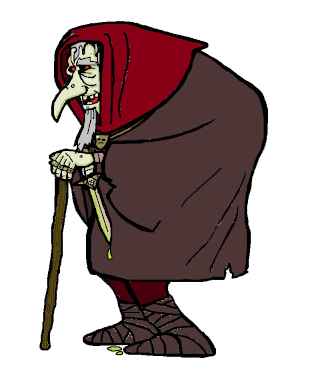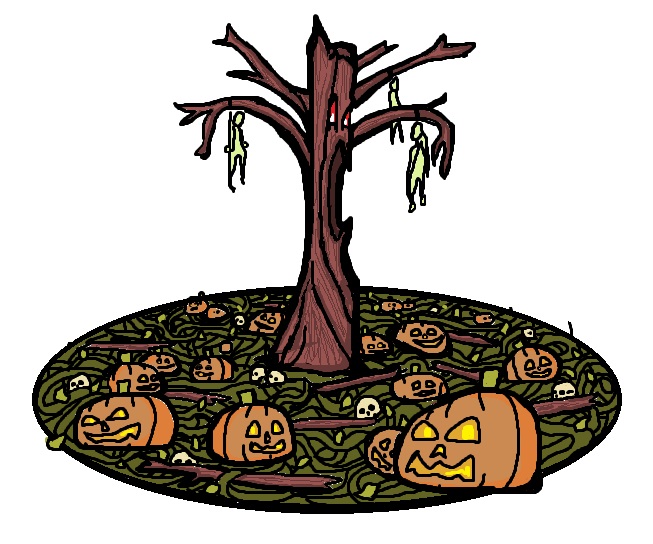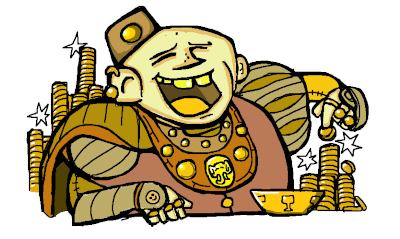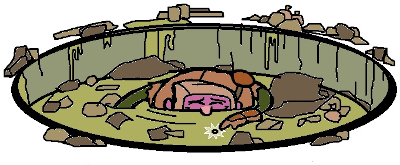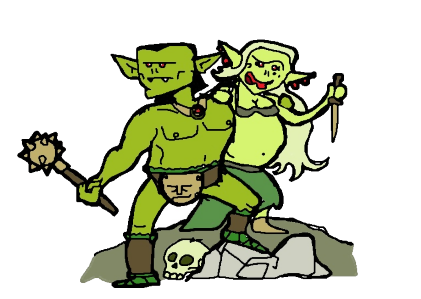Small Gods of the City (Local Faiths): Difference between revisions
mNo edit summary |
mNo edit summary |
||
| Line 98: | Line 98: | ||
==Yevathax, The Tree of the Dead== | ==Yevathax, The Tree of the Dead== | ||
[[File:DeadTree.jpg]] | [[File:DeadTree.jpg]] | ||
Yevathax (or "Yevethax," as the exact spelling is disputed) is a minor deity in the city. It is one of a small handful of gods of undeath that are worshiped in dark corners and dusty cellars. Its faith is spread through rumors of exhausted planar prospectors having survived stumbling onto its plane of vast dry crop fields of pumpkin, wheat and corn that mature into terrible undead creatures that relentlessly attack the would-be explorers. | Yevathax (or "Yevethax," as the exact spelling is disputed) is a minor deity in the city. It is one of a small handful of gods of undeath that are worshiped in dark corners and dusty cellars. Its faith is spread through rumors of exhausted planar prospectors having survived stumbling onto its plane of vast dry crop fields of pumpkin, wheat and corn that mature into terrible undead creatures that relentlessly attack the would-be explorers. | ||
Revision as of 16:29, 22 October 2019
Local Faiths
The Nine Faced God
Followers of the Nine Faced God doubt the existence of any other true deity and all, and instead ascribe all other over-powers everywhere as simple manifestations of their god's many faces and aspects. The God is understood not to directly have specific faces (or, indeed, to possess any true form), but rather manifest itself in nine separate metaphysical directions that influences reality. Faith is heavily based upon obscure numerological principles, with different interpretations of the importance and meaning of respective numbers hotly contested and debated. Many followers carry with them certain special nine-sided die that they roll to offer guidance and wisdom.
While followers will definitely argue and disagree about the meaning of certain numbers, the following meanings are commonly ascribed:
- 9 - Fortune, Luck, Chance, Possibility
- 8 - Life, Death, Immortality, Eternity
- 7 - Apocalypse, Doom, Destruction, Darkness
- 6 - Hope, Salvation, Light
- 5 - Travel, Growth, Learning, Experience
- 4 - History, the Past, Knowledge, Ancient
- 3 - Mystery, Power
- 2 - Love, Hatred, Passion
- 1 - Fate
There is no particular creed or ideology that comes with such a faith with followers tending to believe that the notion of trying to please a god through sacrifice or virtuous act is hopelessly naive. Instead followers of the Nine Faced God simply know that they must go their own way, influenced at every step by the God's Nine Faces, until at last they meet their final fate.
Some followers tend to use the phrase "marked by <a number>" as a way to describe their own views and path. For example, "marked by nine" tends to mean that they have had a lucky life. A scholar might be "marked by four" or an explorer as "marked by five."
The faith of the Nine Faced God tends to be one of the more common ones among those who dwell in the City of Rings.
Pzatharun
At heart, Pzatharun is a God of outcasts, unpredictable and whimsical in the blessings and curses they lay upon the realms of men. Associated with shapeshifting (magical or lycanthropic), changelings, disorder, bouts of mania, artistic inspiration, hedonism and fae. His nature and faith are shrouded in mystery and contradiction, with some saying Pzatharun is a lord of the Fae, others a planar embodiment of chaotic elements, amongst dozens of other conspiracies.
His worshippers include: artistic souls seeking inspiration, revellers, shapeshifters and changelings, enemies of the law, faeries and maniacs. Due to his unpredictable nature, drawing the attention of Pzatharun can be as dangerous as it is beneficial. One day his blessings might lead an author to write his greatest work, the next finding himself incapable of reading it.
Thanks to DI for this faith.
Tchun the Sleeper
The "faith" of Tchun the Sleeper is best described not as a formal religion, but rather instead almost as a kind of sickness. Tchunism can strike without warning: it begins with gloomy dreams of a sleeping giant locked in ice; gradually these dreams increase in intensity and terror until even waking life is a frenzied affliction of haunted visions. Tchunites, once they fully succumb to their dreadful faith, become obsessed with performing acts of extreme wickedness with the seemingly impossible idea that in so doing they will awaken "Tchun the Sleeper."
Occasionally Tchunites are able to stop the growth of their obsession: perhaps through intense meditation, counseling with lay-priests of another faith, or extreme will-power.
Most commonly, however, a Tchunite eventually loses themselves wholly to their waking nightmare.... resorting to a life of outrageous banditry, murder, and worse until they are finally put out of their misery.
Players may input "Tchun the Sleeper" on character creation, and if they do should select a non-good alignment.
Players should portray a more gradual devolution into chaotic-evil madness- the experience of this faith is intended to be a dreadful sickening rather than as something that anyone would embrace.
Tchunites will tend to chant about Tchun as they lose themselves to their frenzy; please be advised that the hostility against this faith is so extreme that other characters are fully in the right to kill a Tchunite out of hand.
Please feel free to consult with Howlando directly if you have questions about how to tastefully portray this faith.
Old Grandfather
"Old Grandfather" is a local god of thieves, skulls, criminality, death, murder, jewels, and darkness.
There are many legends and fables about old Grandfather, each a different telling, but the local thieves and criminal element of Ring 99 in particular are quick to ask for a blessing from Old Grandfather before any heist or dark deed.
Of particular note is "Grandfather's Code," a somewhat murky and ambiguous code of conduct that is meant to keep Grandfather pleased and avert ill fortune. Those thieves who disregard "Grandfather's Code" are said to always come to a bad end. Notably, every thief seems to have their own version of Grandfather's Code.
There are many fables and legends about Old Grandfather. In some, he is an actual thief who can pass through walls and steal piles of gold and rubies from greedy merchants. Others speak of his many dark servants that he calls up from the underworld to enact justice on his enemies. In others, he is a kindly old man who turned to the life of a gentleman thief after his family's inheritance was stolen by wild brigands.
Most consider this faith as a mere superstition, born from campfire tales and clung to by superstitious thieves and desperados, however there is no denying that the creed seems to have a certain enduring quality about it...
The Hundred Scrolls
The City of Rings is a lawless place; many of its wards are crowded with desperate bandits, hungry cannibals, and cruel local gangster-warlords that prey upon others. The Rings are filled with prowling monsters, unstable planar interlopers, and all kinds of deadly dangers. Faced with such dangers, there are plenty who turn to unsavory acts to stay alive: animating the dead, calling upon infernal allies, lying, theft, and worse...
Those Wards that maintain a precarious peace usually do not seek to enforce dictates against such evil acts that occur outside of their walls.
Indeed, there are few who do.
The Arbiters of the Hundred Scroll are an exception.
These strange vigilante-knights, dwelling in their mysterious Cube of unknown origin, range forth through the Rings and enact their own code of punishment upon any who would defy the esoteric law of "The Hundred Scrolls."
In their actions, many have come to look to these mysterious champions as a kind of holy order, and turn to a worship of the Scrolls themselves as the best path for a virtuous and righteous life.
The Renunciation
Located in a distant monastery along the great sludge-canal of Ring 97, the mystery cult of the "Monastery of the Candid Hemlock" has become a new and bustling site of pilgrimage for the followers of a new path simply described as, 'The Renunciation.'
According to the followers of this faith, existence - which they call "The Razor Web" - is a state of profound and continuous suffering that mortal selves find themselves entangled in.
So what is the solution? To kill oneself? No, the Monastery claims they know of a better way to escape suffering, one which also helps others and therefore is altruistic. They claim they have received the answer to this existential conundrum from a prophet centuries ago, and ever since then they have been the guardians and practitioners of this wisdom – a teaching that has the potential to save the entire world from suffering.
Slowly, in increasing numbers, pilgrims have begun to try to find their way to this Monastery to learn about their path...
Thanks to Valpolicella & Iron Oligarch for this interpretation of a faith and creed for EFU.
The Ancestors
The faith of the Ancestors is known to the dwarves as one of the "true faiths"; believing that on their death they shall be enshrined in legend, to be remembered by their descendants and join their Ancestors - if they are judged to be worthy. The obsession with the legends of the faith takes importance over all else while attributing the most arcane of happenings to the will of the mysterious and spirit-like Ancestors who seem to whisper their sage haunting advice to only the most devoted dwarves.
The great drive to become one of the Ancestors, to be judged worthy, has been known to drive some dwarves to truly insane, courageous and even vile acts all in the name of elevating themselves above the mundane. The faith itself is nested in a complex maze of legend, myth, superstition and ritualistic ceremony so deeply that it is hard even for those of the faith to keep them straight, perhaps in part leading to the practice of searching for a single Ancestor to devote themselves to.
Players of this faith should generally be superstitious to some degree. The legends of the Ancestors that currently exist in game will be grown over time and noteworthy PC dwarves of some obvious prominence will be added. It is highly encouraged for players of this faith to either follow one of the Ancestor legends already defined in the game world or to make up their own (this is in addition to a broader worship of the Ancestors as a whole) to further define their personal faith. You need not begin singling out one but it should be a goal to discover one to ascribe to more personally above others.
Yevathax, The Tree of the Dead
Yevathax (or "Yevethax," as the exact spelling is disputed) is a minor deity in the city. It is one of a small handful of gods of undeath that are worshiped in dark corners and dusty cellars. Its faith is spread through rumors of exhausted planar prospectors having survived stumbling onto its plane of vast dry crop fields of pumpkin, wheat and corn that mature into terrible undead creatures that relentlessly attack the would-be explorers.
Sometimes called "the Pumpkin Tree" the planar explorers who come across Yevathax often report a similar pattern of battling through a terrible number of undead creatures to finally make their way to a vast tree covered in pumpkins that sweeps down to give them an offering, as if it is surrendering to their prowess. If any have refused this gift, and attacked the tree, they are not around to tell of it.
Those that offer prayer to Yevathax are not all evil, nor necromancers, and many in Ring 99 will place a pumpkin outside their door during days when necromancers roam in hopes that the favor of the Tree of the Dead will ward away evil spirits. However, all of the gifts of Yevathax are known to spread the seed of undeath one way or another and thus increase its own power in the City of Rings and almost all of them are marked by the bright orange or dark green of Yevathax's colors.
The Followers of Yevathax tend to be more earthy necromancers than high wizards, or shadow conjurers, and often have less ambition than other necromantic cults. They tend to fall into the dark pacts of necromancy because it is an expedient means to accomplish a task, be it farm labor, the defeat of one's enemies or the defense of one's family.
Phanax of Opulence
Known variously as the Smiling Merchant or the Laughing Lord, Phanax is a very new Small God in Ring 99, entirely unheard of until recently. Despite this, he has already gained a following, heralded by gaudy preachers draped in gold and fineries who frequent the taverns of the City.
Considered by his faithful to be a patron of wealth, charm and leisure, his name and image (that of an enormously fat man, smiling jovially) are called upon both by those seeking to make their fortunes and those seeking to enjoy the fortunes they have already acquired.
He is followed by people from all walks of life; beggars, merchants and mercenaries pray to him to see both their purses and their wineskins filled; conmen, bards and socialites for gilded tongues and rapturous crowds; drunkards and hedonists for memorable nights.
Pitter Peter
The small god, known as "Pitter Peter" is the personification of the nearly endless piles of rubble and trash scattered throughout the City of the Rings. It is a covetous god of hoarding and collecting, and many scumpickers pay it tribute - If only to ensure their own findings are a little better than trash. One of its largest shrines is located on Trash Island.
Ngog and Ozod
Goblins in EFU: City of Rings worship a dual deity known as Ngog and Ozod, believed by goblins to be the origins of all goblin-kind. Ngog, the Father, deals with war, expansion, brutality, thievery, and all other vile goblin deeds while Ozod, the Mother, deals with fertility, survival, rituals, sacrifice, murder and other equally as vile goblin deeds.
The Lord Departed
From the sacrosanct halls of House Nephezar to the meager almshouses of the Mongrelwoods, righteous men and women of holy inclination whisper their prayers to the God who once reigned in heaven, awaiting the day He shall return in all His glory to make right all the evils in the world. These desperate prayers take many forms, from pleading to bartering to invitation, but all address the profound absence felt at Heaven's heart. This absence is what they believe has allowed evil and corruption to take root.
Yet while the Lord has gone from heaven, He has not gone from the world- or so those of the faith believe. By inviting Him into one's heart, and living a life of purity, faith, and righteousness, the faithful make ready God's throne for His renewed ascent.
The House of Nephezar claim a miraculous descent from the Lord Departed and His Blessed Angels, and those among the faith are often drawn to the house, where they perform innumerable liturgies, prayers, and rites in their archaic tongue.

